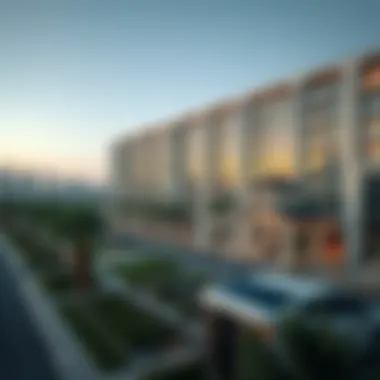Comprehensive Guide to Dubai Residence Permits


Intro
Navigating the landscape of residence permits in Dubai can be a complex endeavor, driven by rapid development in both its economy and real estate markets. For expatriates and investors alike, understanding the ins and outs is crucial. This article lays bare the various aspects of obtaining a residence permit, focusing on the types of permits available, specifics of the application process, and eligibility criteria. Moreover, it highlights the intricate connection between residency status and real estate investments, making this guide an essential tool for anyone looking to establish their footing in one of the world’s most vibrant cities.
As each step taken towards securing a residence permit can influence business decisions and personal situations, the guidance provided will prove invaluable. For example, did you know that certain residence permits can enhance your options in property investment and ownership?
This guide is crafted for real estate agents, investors, expatriates, and homeowners, providing in-depth analyses and strategies. By retaining a focus on actionable information and insights, we aim to equip readers to face the opportunities—and challenges—of residency in Dubai's dynamic market.
Foreword to Residence Permits in Dubai
Obtaining a residence permit in Dubai is a critical step for anyone looking to settle in this vibrant city. The allure of Dubai is not just its gleaming skyscrapers or luxurious lifestyle; it�’s a bustling hub for business, leisure, and multicultural exchange. For expatriates, understanding the intricacies of residence permits is more than just about legality; it’s about securing a pathway to integrate into this dynamic society.
Residence permits in Dubai open up a host of opportunities. Whether you’re an investor eyeing the booming real estate market, a professional seeking job security, or a family member ready to join loved ones, having a residence permit paves the way for stability and growth. The process can be overwhelming, considering the various types and eligibility criteria. However, grasping these elements is paramount for a successful transition into life in Dubai.
For starters, residence permits offer a sense of belonging. They grant the holder not only legal status but also access to essential services such as healthcare and education, which are cornerstones of a thriving community. An expatriate's life in Dubai hinges on these permits; they impact everything from housing to schooling options for children.
Moreover, understanding the specific types of residence permits can help individuals and families make informed decisions tailored to their unique situations. Also, expatriates will find that there are various pathways to apply, which can be advantageous both personally and professionally. If you are thinking about making Dubai your home, knowing the ins and outs of residence permits gives you an edge in navigating the various bureaucratic hurdles while ensuring compliance with local laws.
In summary, digging into the topic of residence permits in Dubai is not just advisable, it’s essential. It’s about laying the groundwork for a quality life in a city that stands at the forefront of global development. Embracing the chance to live and work here could very well be the smartest move one could make in their career journey.
Types of Residence Permits
Understanding the various types of residence permits in Dubai is crucial for anyone considering a move to this vibrant city. It isn’t merely an administrative step; rather, it sets the stage for a myriad of opportunities—from career advancements to educational pursuits. This guide will walk you through the distinct categories of residence permits available in Dubai, highlighting their specific benefits and considerations to help you make an informed decision.
Employment-Based Residence Permits
Employment-based residence permits are primarily issued to foreign workers who have secured job offers from Dubai-based companies. This type of permit is a necessary step for individuals aiming to build a career in the UAE. The hiring company must sponsor the employee, which means they must handle the bulk of the paperwork and bear financial responsibilities.
- Key Benefits: Stability is often the biggest draw. Once granted, workers can enjoy the benefits of living in Dubai while pursuing career developments in their respective fields.
- Considerations: Importantly, employment permits are usually tied to the employer. If a worker changes jobs, they’ll often need to apply for a new permit, necessitating careful navigation through temptations of changing workplaces.
Investor Residence Permits
Investor residence permits cater to those who plan to invest in Dubai’s economic landscape, often through owning property or starting a business. The criteria generally dictate a minimum investment threshold, which varies depending on the type of investment. These permits allow individuals to secure their residency in a city that offers a buoyant market for real estate and entrepreneurial endeavors.
- Key Benefits: Investors enjoy not only residency but also the advantages of real estate ownership without needing a national partner. In addition, there are no income taxes on individual earnings, creating a lucrative environment for growing wealth.
- Considerations: The fine print includes a commitment to maintain the investment value and other responsibilities attached to property management or business operations. Investors must remain engaged to avoid lapsing their residency status.
Family Sponsorship Permits
Family sponsorship permits are intended for expatriates who wish to bring family members along to Dubai. This permit allows workers with a valid residence permit to sponsor their spouses, children, and sometimes even parents, ensuring that families can remain together in this cosmopolitan city. Conditions such as minimum salary thresholds and proper accommodation types apply.
- Key Benefits: This permit fosters a sense of community and belonging, as families can stay together, and it encourages stability within the household. Additionally, family members often gain access to healthcare and education opportunities in the UAE.
- Considerations: While this route seems straightforward, potential sponsors should thoroughly understand the eligibility criteria and required documentation. Ensure you gather all necessary paperwork to prevent hiccups in the application process.
Retirement Residence Permits
Retirement residence permits are part of Dubai's ongoing efforts to attract older expatriates looking for a sunny haven during their golden years. These permits cater to individuals aged 55 and above, providing them with the opportunity to enjoy Dubai’s amenities, culture, and warmth.
- Key Benefits: Retirees can relish in the idea of a tax-free income and live in one of the safest cities globally, while enjoying access to a wide range of recreational and social facilities geared toward seniors.
- Considerations: It’s important to note that certain financial thresholds must be met, such as minimum monthly income or a specific amount in savings or investment property, ensuring that retirees can sustain themselves in the city.
Dubai's flexibility in residence permits reflects its evolving demographic landscape, catering to a global community seeking both opportunity and lifestyle.
Navigating the different types of residence permits in Dubai is a worthwhile effort for anyone eager to explore life in this dynamic region. Each category has its own merits and challenges, which need to be understood well to harness the full potential of residency in Dubai.
Eligibility Criteria for Residence Permits
The eligibility criteria for residence permits in Dubai serves as the foundational fingertips for anyone wishing to anchor their life in this progressive emirate. Knowing these guidelines not only streamlines the application process, but also prevents unnecessary hiccups along the way. For potential residents—whether they’re job seekers, investors, or family members—understanding these prerequisites can make or break the journey of making Dubai a home.
Work Visa Holders
First up, let’s hit on work visa holders. Those who have secured a job in Dubai play a vital part in the local economy. Companies often sponsor them for residence permits, making it a pivotal step in falling under this category. It's advisable for prospective employees to ensure their employer is a legitimate entity; a dodgy company could mean trouble down the road.


Key Points to Note:
- Employment Contract: An employment contract is usually a requirement for obtaining a residence permit. This document should be detailed enough, outlining responsibilities, salary, and other work conditions.
- Labour Card: Holding a valid labour card is essential. This card proves that the individual is legally allowed to work within the emirate.
- Medical Fitness Test: Applicants must also undergo a medical examination to confirm they don’t harbor any communicable diseases.
This route offers a straightforward way for skilled workers to establish residency and contribute to the work landscape of this bustling city.
Investors and Business Owners
Moving onto the realm of investors and business owners, it’s another avenue with its share of perks. Dubai's investment scene is vibrant, often enticing expats to set up shop in various sectors ranging from luxury real estate to tech startups.
Consider the Following Aspects:
- Minimum Investment Requirement: Typically, you’ll need to commit a certain amount of capital, often starting at AED 1 million for property investment, or AED 500,000 for establishing a business in a free zone.
- Ownership and Control: To get the residence permit, the investor must have at least 100% ownership of the company or property.
- Proof of Financial Stability: It’s very likely that one will need to show adequate proof of financial backing to ensure the business can sustain itself.
Investing in Dubai not only opens the doors for residence but also positions one to tap into the city’s booming market.
Family Members
Finally, a glance at family members who wish to accompany the primary residence permit holder. Dubai recognizes the importance of family unity, thus offering a path for dependents to also secure residency.
Important Considerations for Family Sponsorship:
- Sponsorship Documentation: The primary resident must provide proof of their status, such as a valid residence permit and employment confirmation.
- Relationship Proof: Documents establishing the familial relationship, whether it's a marriage certificate or birth certificates for children, are often necessary.
- Financial Support Assurance: The primary sponsor must prove they have the financial means to support their dependents.
This pathway ensures that families are not left behind and can enjoy what life in Dubai has to offer together.
Application Process for Residence Permits
The application process for residence permits in Dubai is the backbone of your journey towards legal residency. Successfully navigating this process provides expats not just a way to live and work in the city, but also opens up numerous opportunities in a rapidly evolving market. It’s crucial to understand the steps involved, as they can significantly impact your overall experience in Dubai. Moreover, a well-executed application can make a world of difference in securing the right residency status without unnecessary delays or complications.
Required Documentation
Gathering the right documentation is the starting point of any application process for a residence permit. This is where many applicants falter, often due to oversight or misunderstandings about what is essential. Required documents typically include:
- Passport: A valid passport with a minimum validity of at least six months.
- Application Form: A completed application form, specific to the type of residence permit you are applying for.
- Photo: Recent passport-size photographs that meet the specification.
- Proof of Employment or Investment: For employment-based permits, a copy of your work contract or for investors, your trade license.
- Medical Certificate: A health report confirming negative results for communicable diseases, usually required by the Dubai Health Authority.
- Bank Statements: Sometimes required to demonstrate financial stability.
These documents need to be collected meticulously, as any missing piece can stall the application, causing annoying delays.
Step-by-Step Application Guide
The application process can feel complex, but breaking it down into manageable steps can simplify the journey. Here’s a concise guide:
- Choose the Type of Permit: Identify the specific type of residency permit that aligns with your needs, whether it’s employment-based, investor, or family sponsorship.
- Gather Documentation: Compile the necessary documents as listed previously. Ensure everything is up-to-date and correctly formatted.
- Submit Application: Visit the relevant authority, such as the General Directorate of Residency and Foreigners Affairs (GDRFA), to submit your application. You might also be able to do this online.
- Application Fee: Be ready to pay the applicable fees. The cost will vary based on the type of permit you are seeking.
- Wait for Approval: After submission, you’ll often need to wait for processing. Keep your communication lines open, as authorities may reach out for additional information or clarification.
- Receive Permit: Upon approval, follow any necessary procedures to collect your residence permit, such as biometric data submissions.
Following this guide step-by-step can help in ensuring a smooth application process.
Common Pitfalls to Avoid
Even seasoned applicants can sometimes trip over common pitfalls that lead to extra hassle. Here are a few things to keep in mind:
- Incomplete Documentation: Ensure all required documents are complete and checked. Incomplete applications are a leading cause of rejection.
- Ignoring Updates: Regulations change frequently in Dubai. What was required yesterday might not necessarily be sufficient today. Stay abreast of current laws.
- Misunderstanding Eligibility: Each type of permit has different eligibility criteria. Check thoroughly to avoid wasting time applying for an unsuitable permit.
- Underestimating Processing Time: Expect delays. It’s prudent to factor in additional time beyond what is average.
- Neglecting Renewal Dates: Once you have your permit, remain vigilant about renewal dates to avoid any lapses in residency status.
"The road to residency might appear winding, but clear steps and proactive actions can lead to fruitful outcomes."
By avoiding these pitfalls, applicants can enhance their chances of a successful application, potentially unlocking the myriad lifestyle opportunities that Dubai offers.
Maintaining Residency Status
Maintaining residency status in Dubai is not just about having a piece of paper; it symbolizes a commitment to living in this bustling hub of trade and culture. It's essential for expatriates, investors, and families alike. When you hold a residence permit, you gain access to numerous services and opportunities that enhance your living experience. However, maintaining that residency status is no walk in the park. Various factors come into play, and understanding them is crucial to avoiding pitfalls.


Renewal Process
The renewal process for residence permits is akin to renewing a lease; it requires attention to detail and timely action. Generally, residence permits in Dubai are valid for two or three years, depending on the type. Most importantly, individuals should start the renewal process at least 30 days before the current permit expires. This gives ample time to gather documents and address any issues.
To kick off the renewal, you'll need:
- Your current residence permit
- A valid passport
- A recent passport-sized photograph
- Health insurance coverage proof
- Any additional documents required by your specific sponsor or visa category
There's no cookie-cutter approach here. Each situation can vary based on individual circumstances and the category of the permit.
Once the necessary paperwork is organized, you can submit your application through the General Directorate of Residency and Foreigners Affairs (GDRFA) either online or in person. The review process can take several days, so patience is key. Keep in mind that failing to renew on time can lead to additional fees or even complications in future applications.
Overstay Consequences
Let’s be real; overstaying a residence permit can land you in hot water, and nobody wants that. The rules are rather strict in Dubai regarding overstays. If an individual overstays their permit, they may face hefty fines. The fine starts accumulating from the first day of the overstay, meaning that even a single day can cost you. To give you an idea, the charges can reach AED 125 for the first day and AED 25 for each additional day thereafter.
Additionally, the consequences aren't just financial:
- You may find it challenging to reapply for a residence permit.
- Overstaying can lead to a ban on returning to the UAE for a specified period.
- In some cases, legal proceedings could ensue, particularly if the overstay is significant.
Important: Regularly check the expiration dates of your permits and renew promptly. It's better to be proactive than to take risks.
In short, maintaining residency status means keeping an eye on deadlines and understanding the processes involved. This is essential not just to bypass fines, but also to enjoy the lifestyle and opportunities that Dubai offers to its residents.
Impact on Real Estate Investments
The intricate relationship between residence permits and real estate investments in Dubai cannot be emphasized enough. For many expatriates and investors eyeing the property market in this bustling metropolis, understanding how residency status shapes ownership and investment opportunities is crucial. This section dives into the specific elements that guide one's decision-making when it comes to real estate in Dubai.
Residency and Property Ownership
Owning property in Dubai is a one-way street cleared of many potential obstacles if you hold a valid residence permit. This legal status not only qualifies you to purchase real estate but often increases your benefits as an investor.
- Types of Properties: Residents can buy freehold properties, which grant full ownership rights. This is particularly appealing to those who prefer long-term stability over short-term rentals. Freehold locations like Dubai Marina or Downtown Dubai tend to attract high demand and potentially offer significant returns on investment.
- Ownership Structure: Foreign investors who hold a residence permit can opt for unique ownership structures. For instance, they can set up a company to invest in real estate, providing an extra layer of security and financial flexibility.
- Legal Protections: Having residency offers certain legal safeguards, such as the ability to access mortgage services from local banks more easily, as lenders usually prefer dealing with residents. Banks may offer attractive mortgage rates to residents as a means of boosting their client base.
Investing in real estate can be among the most rewarding financial decisions you can make, particularly when coupled with a residence permit. However, it is essential to be aware of market fluctuations and legal changes that can impact your investment.
Investment Opportunities for Residents
Being a resident not only opens the door to real estate ownership but also merges you deeply with the local economy's fabric, where countless opportunities bloom. Here are some noteworthy avenues residents can explore:
- Off-Plan Projects: Residents have a specific edge in acquiring off-plan properties that promise high returns once completed. Developers often prioritize residents in their sales strategies, giving them first dibs on prime investments.
- Diverse Market Segments: The Dubai real estate market is vast, catering to various segments, from luxury residences and short-term rentals to affordable housing. Investors can find niches that suit their financial goals and risk tolerance, which is often more accessible for residents.
- Tax Incentives: Unlike many countries, Dubai’s tax regime is advantageous for residents. The absence of property tax and capital gains tax translates into higher net profit from real estate investments, enhancing the overall return on investment.
"Holding a residence permit in Dubai doesn’t just provide you a legal dwelling; it propels you into a world of investment opportunities that can redefine your financial future."
In summary, the interplay of residence permits and the real estate landscape in Dubai is a vibrant realm where potential meets practicality. Engaging with this ecosystem requires not only awareness but also a strategy that sifts through the dense offers available – all while keeping the broader economic view in mind. Whether you are an expatriate considering a long-term stay or an investor eyeing growth, understanding this impact can serve as a valuable compass guiding you through the Dubai real estate horizon.
Benefits of a Residence Permit in Dubai
A residence permit in Dubai offers a multitude of advantages that are pivotal for expatriates and investors looking to make the most of their time in this bustling emirate. Holding a residence permit not only opens doors to various essential services but also enriches overall life experiences in a city known for its dynamic atmosphere and opportunities. Understanding these benefits is crucial for anyone considering making Dubai their home or investing in its promising real estate market.
Access to Healthcare Services
One of the foremost benefits of having a residence permit in Dubai is the access to quality healthcare services. The United Arab Emirates has established a robust healthcare system, boasting modern facilities and highly qualified medical professionals. Residents are often eligible for comprehensive health insurance, which can sometimes be subsidized by their employers. Here are a few key points to know about healthcare access:
- Quality Care: Dubai's healthcare system is known for its high standards. The emirate is home to numerous private and public hospitals that offer a range of services, from routine check-ups to specialized treatments.
- Affordable Treatment: Many residents find that treatment is more affordable when covered by health insurance. This can significantly ease the financial burden of medical expenses.
- Emergency Services: In case of emergencies, residents can rely on prompt services, with ambulances equipped with advanced medical equipment on standby.
Important Note: Having a residence permit also allows for easy registration with health services, ensuring that you can access necessary medical care without unnecessary hurdles.
Education Opportunities


For expatriates with families, one of the appealing aspects of securing a residence permit is the access to a myriad of educational opportunities for children. Dubai boasts an array of schools and educational institutions that cater to various curricula, including British, American, and the International Baccalaureate. Here’s why education is a significant benefit:
- Quality of Education: Many schools in Dubai are internationally accredited and employ highly experienced educators, which imbues students with a solid educational foundation.
- Diverse Options: Parents can choose from private schools, international schools, and even higher education institutions, depending on their educational philosophy and desired curriculum.
- Extracurricular Activities: Schools in Dubai typically offer a wealth of extracurricular opportunities, encouraging holistic development through sports, arts, and other activities.
"Dubai’s education system is a compelling attraction for many expatriates, providing world-class opportunities for learning and growth."
Quality of Life
Living in Dubai comes with a promise of a high quality of life that many find attractive. With its unique blend of modernity and tradition, residents enjoy various facets of life that enhance satisfaction and well-being, such as:
- Safety and Security: Dubai is known for its low crime rates and high safety standards, providing peace of mind for families and individuals alike.
- Cultural Diversity: The city is a melting pot of cultures, with expatriates from all corners of the globe fostering a rich cultural exchange that broadens horizons and promotes inclusivity.
- Recreation and Leisure: From world-class shopping malls to stunning beaches and outdoor activities, the city offers ample opportunities for leisure and entertainment, contributing to a well-rounded lifestyle.
In summary, a residence permit in Dubai is more than just a document; it opens up a world rich in essential services and life-enhancing experiences. Whether it's the healthcare access, educational prospects, or overall quality of life, understanding these benefits allows individuals to make informed decisions about their future in this vibrant emirate.
Challenges Faced by Residents
Facing new challenges is a common thread in the lives of those who move to Dubai. For expatriates and new residents, recognizing and navigating these hurdles is crucial. The challenges, while significant, provide an opportunity for growth and adaptation in a constantly evolving landscape.
One notable challenge is cultural adjustment. Dubai is a melting pot of cultures, making it a fascinating place to live, but it can also be overwhelming. New residents, especially those from vastly different cultural backgrounds, might find themselves grappling with the local customs and traditions. For instance, understanding the nuances of Islamic practices, especially during the month of Ramadan, or adjusting to the social norms can be daunting. Effective communication is essential here; language barriers can sometimes leave residents feeling isolated. Furthermore, not being familiar with local etiquette can lead to unintentional faux pas, which may not endear new residents to their surroundings.
Another aspect is legal considerations. The legal landscape in Dubai can be a minefield for the uninitiated. It's vital for residents to familiarize themselves with local laws, particularly concerning residency regulations and labor laws. Many newcomers might not realize the stringent rules surrounding employment contracts or how residency permits are tied to job sponsorship. Misunderstanding these regulations can lead to dire consequences, such as hefty fines or even deportation.
"Understanding local laws is not just beneficial but essential for expats wishing to live smoothly in Dubai."
In addition to cultural adjustments and legal intricacies, the cost of living presents another challenge. While many are drawn to Dubai for its luxury and lifestyle, the reality is that basic living expenses, including housing, education, and healthcare, can drain finances quicker than expected. Many find that their budget must be adjusted constantly in the face of rising costs, emphasizing the need for careful financial planning before making the leap.
Furthermore, engaging with the local community can be challenging. New residents might struggle to forge connections and build a social support network in an unfamiliar place. Social gatherings, which can be pivotal for easing the transition, may feel exclusive or intimidating at first.
In summary, while living in Dubai offers numerous advantages, it is essential to pay attention to the challenges that accompany this vibrant lifestyle. From cultural adjustments and legal hurdles to navigating the local economy and community, being aware of these potential issues can make a world of difference in the adaptation experience and overall satisfaction with life in this dynamic city.
Future of Residency in Dubai
The future of residency in Dubai presents both challenges and opportunities that are well worth exploring. As the city evolves into a global hub for business and tourism, changes in immigration policies and trends in expatriate settlements are likely to shape the landscape of residency permits. Understanding these dynamics helps both prospective residents and current expatriates navigate their options more effectively.
Changes in Immigration Policies
Dubai's immigration policies are not set in stone; they are influenced by a variety of factors including economic conditions, international relations, and social dynamics. In recent years, we've seen a trend towards increasingly flexible policies that cater to a diverse range of professionals and investors.
For instance, the introduction of long-term visas for skilled professionals and investors is notable. These measures are designed to attract talent and investment into the UAE, promoting not just economic growth but also cultural exchange. Changes such as expedited processes for obtaining residence permits can greatly benefit those looking to start a business or participate in the workforce.
In addition to these broad measures, it is essential to stay abreast of specific regulations, which can shift based on government objectives. The UAE has demonstrated a willingness to revise policies regularly, aiming to remain competitive in the global market. Following local news and government updates can help potential residents anticipate changes that could affect their applications and status.
Trends in Expatriate Settlements
The trend of expatriates settling in Dubai continues to gain momentum, driven by several factors that make the emirate an attractive location. Firstly, the city’s strategic positioning as a commercial crossroads between East and West facilitates international business opportunities. This positioning tends to appeal to those in sectors such as finance, technology, and logistics.
Commonly, expatriates find themselves gravitating towards neighborhoods that offer a blend of culture, modern amenities, and community spirit. Areas such as Dubai Marina and Downtown Dubai are often hot spots for expatriates due to their vibrant lifestyles and accessibility. However, there is also a growing interest in suburban developments out of the busy city center, which offer more space and a family-friendly atmosphere.
Moreover, the introduction of special projects like the Dubai 2040 Urban Master Plan aims to enhance livability and infrastructure, thereby attracting a broader demographic of expatriates. This plan focuses on sustainability and smart city initiatives, further built on the notion that residency in Dubai is not just about living; it’s about thriving in an environment that offers opportunities for growth and innovation.
As the city continues to develop, those interested in obtaining a residence permit in Dubai should keep an eye on these evolving trends and policies, ensuring they are well-prepared to embrace the future.
Finale
Navigating the landscape of residence permits in Dubai is not just a matter of paperwork. It holds substantial importance for expatriates, real estate investors, and anyone looking to call this vibrant city home. Concluding this guide, one should reflect on several essential aspects that underscore why understanding residence permits is crucial.
First, it’s vital to recognize the diversity of options available. From employment-based permits to investor options, each pathway serves different needs and circumstances. The clarity on which permit aligns with one’s situation provides a robust foundation for future planning.
Furthermore, understanding the application process can save time and potential frustrations. Missteps in documentation or applications can delay residence status, leading to unneeded complications. As such, being well-informed can streamline one’s approach and ensure a smoother transition into residency.
The benefits conferred by holding a residence permit in Dubai, such as access to quality healthcare and education, cannot be understated. These factors significantly contribute to one's overall quality of life and can influence long-term satisfaction in the emirate. Moreover, they pave the way for deeper integration into Dubai’s dynamic culture and community.
Challenges such as legal considerations and cultural adjustments might seem daunting. However, being prepared can empower residents to navigate these hurdles more effectively. Recognizing and addressing these challenges early on allows for a seamless adaptation process, making life in Dubai far more enjoyable.
Looking ahead, the future of residence permits in Dubai promises to evolve. Changes in immigration policies and trends in expatriate settlements could reshape the landscape significantly. Keeping abreast of these developments is essential for those contemplating or current residents who want to stay ahead of the curve.
In summary, grasping the intricacies of residence permits in Dubai is not merely an academic exercise; it's an essential component of achieving one's goals in one of the world's most progressive cities. Equipped with the right knowledge, expatriates and investors can seize opportunities that align with their aspirations, ultimately leading to a richer and more fulfilling experience in this bustling metropolis.











